Latest Contributions
Summer Holiday in Chail (night in jail) and Simla
Category:
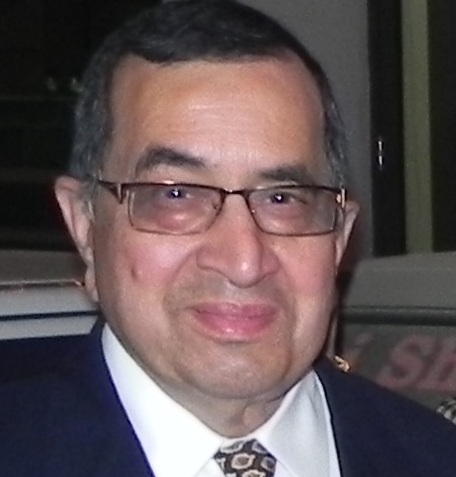
Born in 1941, Vinod was brought up and educated in Amritsar. He attended Government Medical College, and subsequently trained as a surgeon at PGI, Chandigarh. He left for USA in 1969, and retired in 2003 as Director of Critical Care Services at a teaching hospital in Michigan. Married with two grown sons, he continues to visit India at least once a year.
At long last, we had passed our final MBBS exams. After five years and many upheavals in our young lives, we were done with the grind.
After another six months of an easy internship without pay, we would get our medical degrees at the end of 1964. And then, we would be on our way to glorious careers in medicine! That is the way it looked to me in early 1964 at the age of twenty two.
Jitinder, one of my friends, suggested that four of us friends could go on a holiday\; he would be able to get his family car for the journey. Others were equally enthusiastic - of course, no other family had a car! We agreed to gather in Ludhiana at Jitinder's home, and go from there to Simla.
Jitinder, the tall, handsome son of an army doctor had been driving for years. Gurmit had come from Malaya (before it became Malaysia) to study medicine. He was a tall and big Sikh, good at shot put and field hockey. I had roomed with him when I moved from my home in Amritsar to the Medical College hostel, which was also in Amritsar. He purposely gave the impression of being a big dufus but was actually quite intelligent. He had the distinction of winning a bet by eating 36 raw eggs at one go. Vidya Sagar Banka, my other friend, and I must have looked puny in comparison to the big Sikh. No wonder, he was a legend at college!
Jitinder, Gurmit and some other students had been part of a group our classmates had dubbed Angrez (British, or other white foreigner). In Jitinder's case, it was because of his very fair complexion. Others ‘qualified' for membership in this group because of they could speak fluent English, and seemed to prefer watching English movies instead of popular Hindi films.
Banka and I were considered chamchas, meaning those wannabes who wished to join this exclusive group. After five years, these derogatory terms were of little consequence. Banka had actually known Jitinder for a while when they were pre-medical students at DAV College, Jalandhar. Banka said that even there Jitinder was called ‘white man' by his classmates.
Whenever the hostel kitchen was closed because of a holiday, several of my friends would eat at my home, courtesy of my mother.
In the days before our trip, I got two letters of introduction. Since hardly anyone had a telephone those days, it was normal to write letters. One letter was from my father to a merchant friend in Simla (still pronounced Shimla by Punjabis). The second letter was from Uncle Yog Raj to a police officer in the small town of Chail. The police officer was once posted in Amritsar and well known to my uncle.
I left Amritsar by train for Ludhiana, while Banka came there from Nakodar, a small town near Jalandhar. Jitinder's house was situated in a nice part of Ludhiana. It appeared to be a relatively new house, quite airy with sun streaming in all rooms. It was a revelation that all adults seemed to have their own rooms. Jitinder's mother and father were very pleasant. His father was a radiologist who had retired as a brigadier from the Indian Army. Shorter than Jitinder but equally fair, the doctor had a neatly set gray beard.
Jitinder was the only clean-shaven male in his Sikh family. I was vaguely familiar with the story how his older sister had cut his hair in childhood and after that he refused to grow his hair long. We also met his younger sister Ramona, who was studying at the local medical college in Ludhiana. Gurmit was already there.
For me it was strange enough that we were offered a glass of beer for lunch but later were even allowed a drink with dinner!
Next day, after a good breakfast, we took off in Jitinder's family car. We passed through the newly built city of Chandigarh. Though I had visited the amazing Corbusier city a couple of times earlier, it was still mind-boggling to see the wide boulevards and buildings. We stopped by the small town of Solan to stock up on Dyer Meakin Mohan beer, which came in large amber glass bottles. We also bought some rum for our cold evenings in the hill station. Solan for many years used to be where Punjab University was located after India's partition.
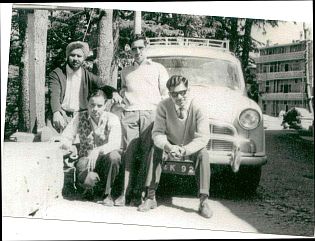
Sitting: left Jitinder, right Vidya Sagar Banka. Standing, left, Gurmit Singh, right, Vinod Puri. Ambassador car. Chail, 1964
We stopped at the lesser hill station of Kasauli for lunch. It was evening before we reached Chail, where we had tea at a roadside dhaba. Chail, a small hill station was a part of the Maharaja of Patiala's estate. The British had apparently banished the Maharaja, the ruler of the largest principality in Punjab, from visiting the Mall - the glamorous part of Simla. So, the Maharajah had developed Chail, where he built a palace, and set up a private school.
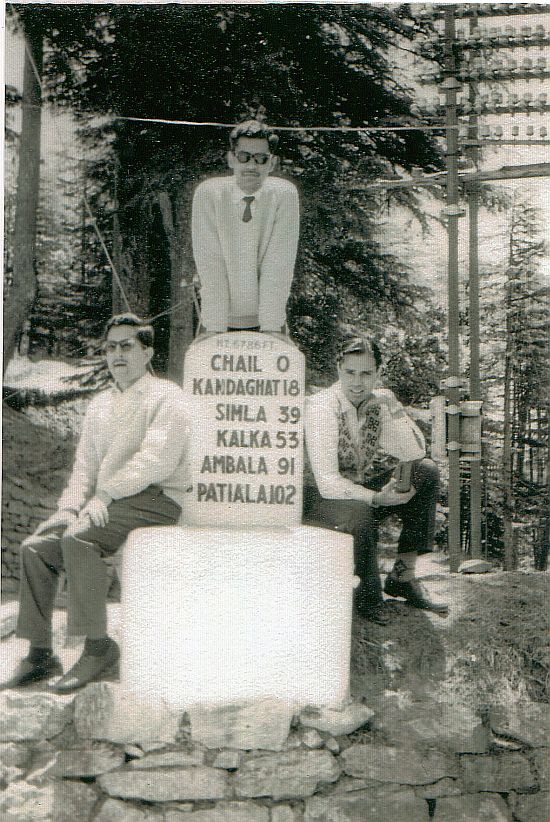
L to R: Vinod Puri, Vidya Sagar Banka, Jitinder. Distances in miles. Chail, 1964.
Chail was up in the mountains, and it was getting cold. There wasn't a whole lot to see in the evening gloom. There was definitely no place to stay. We enquired about the police station at the dhaba, thinking that the police would know where we could eat and stay the night. It wasn't too difficult to find the police station, which was a small low-slung building.
Fortunately, the police inspector was there. A constable took us to him. I handed him the letter from Uncle Yog Raj.
"How is Lala Yog Raj?" The tall inspector with the movie star mustache asked.
"He is well and he asked us to contact you for help." I replied.
When he found out what we needed, he quizzically examined all of us.
"Sorry doctor sahibs," he responded. "This is a very small place, nothing compared to Amritsar. There is no hotel and no restaurant here."
"What will we do?" Jitinder blurted out. "We can't drive in the dark."
"I will make arrangements." The inspector assured us.
He called his head constable. They walked a few steps away in the stone courtyard for consultation. He came back and smiled, "Now relax, you are my guests tonight."
He sent his constable to buy two chickens. The rooms next to his office that served as the local jail were vacant. The police staff set up charpoys (string cots). We looked at each other - were we going to spend the night in these cells? We understood that we had no choice - it was the best that could be arranged.
We washed up and sat in the chairs set for us in the courtyard. The freshly bought rum came in handy as we sat drinking. Very soon, we could smell the chicken curry being cooked. Our dinner turned out to be pretty good.
Jitinder asked about visiting Maharajah's palace.
"He has a great collection of paintings?"
"Yes, I know what you want to see!" The policeman replied. He told us that he would arrange for us to see that part of the collection.
Our night in the jail was actually quite pleasant. The blankets were of rough wool but warm. Next morning we got tea in brass tumblers, and breakfast of pranthas and potatoes.
We visited the cricket grounds on top of a hill. The hill had been flattened, and the grounds were surrounded by tall pine trees.
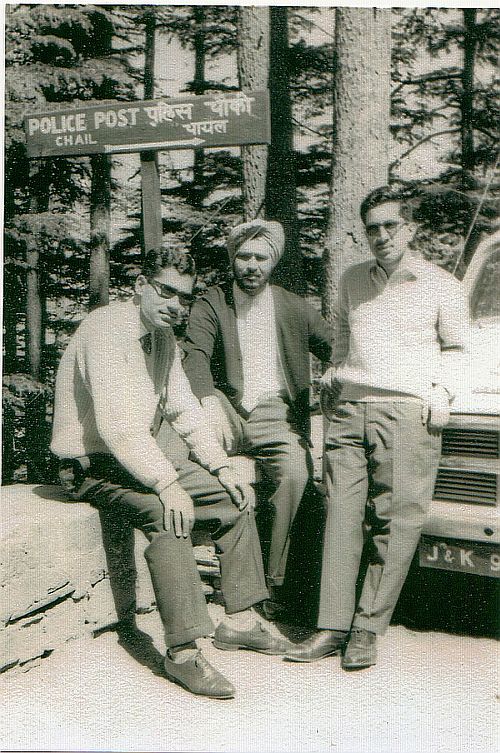
L to R: Vidya Sagar Banka, Gurmit Singh, Vinod Puri. Chail, 1964.
The approach to the Palace was impressive and the small palace was well maintained. The collection of paintings at Maharajah's Palace was exquisite. I had not visited any Indian museum that had paintings by Europeans. There appeared to be paintings by French artists displayed in a narrow hall with sunlight streaming through high set window-panes.
There were a few paintings of nudes. We were told by the policeman that part of the collection was off-limit. Though we never found out, it was rumored that the Maharajah had a big collection of erotic art. To our young minds' imagination, that was a great loss. Gurmit was gruff about it, "What the hell, why can't we see it?"
There really was nothing to do but push off.
Jitinder had promised to show us his boarding school at Sanawar. This was the legendary Lawrence Public School. We rode through the winding hill roads to reach the school grounds. The school was out, so we were able to see the buildings. Narrow church-like arches that framed the buildings were obviously built in English style. The classrooms were barrack-like stone buildings covered with ivy. There was an impressive clock tower and a sign on a building that said Parker Hall. The playgrounds were well kept. Spread over 165 acres in the Kasauli Hills, the school was very different from the schools I knew.
In those days, Simla was not crowded as it is now. A leisurely walk on the Mall was possible. There was the usual bandstand at one end of the Mall. This was a fixture of all hill-stations built by the British. We saw the steps leading down to what was known as Chota Simla. The older part of the city was a warren of shops and houses with narrow streets.
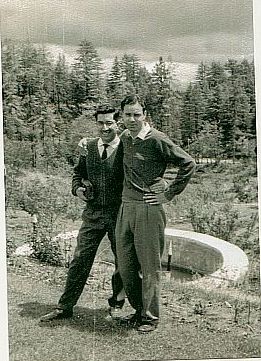
L to R: Vinod Puri, Jitinder. Playgrounds in the hills. 1964.
We found a hotel to suit our budget on the Mall. We were all shivering and unconformable on the first night. Next day, we found the shop of the merchant my father had written to. He was an older man with a mostly bald head and a few sprouting grey hair. He sold goods for tourists such as furs, antiques and shawls. He was business-like.
"What can I do for you?"
I explained that we were cold at night in the hotel.
"I will send blankets for all of you," he promised. And, he delivered.
We made a trip to Kufri to see the snow. There was some on the hills. For plain dwellers like me, it was still an amazing sight. (In November 2009, I revisited the area with my wife, completely bypassing the crowded city and the Mall. Wildflower Hall is a beautiful tourist resort next to Kufri. We were told that it does not snow at Kufri. One could look in the distance, and see mountain tops with patches of snow.)
For the next three days, we roamed the Mall, ate in small restaurants, and drank some beer. We saw some of the well-known buildings and estates. Simla had been the summer capital of the Raj, and there were still lingering relics of British rule.
Our return trip was uneventful.
Now, we were ready for the next phase in our lives. We were going to be real doctors!
Epilogue
Gurmit Singh went back to Malaya, and worked there for many years. Unfortunately, he is now deceased. Jitinder moved to England, and then to USA\; he retired as a radiologist and lives in Smithfield, NC. Vidya Sagar Banka went to USA\; he retired as a cardiologist of international renown, and lives in Philadelphia, PA.
_______________________________________
© Vinod Puri 2015
Editor's note: I approve all comments written by people. The purpose of approval is to prevent unwanted comments, inserted by bots, which are really advertisements for their products.
Comments
Add new comment